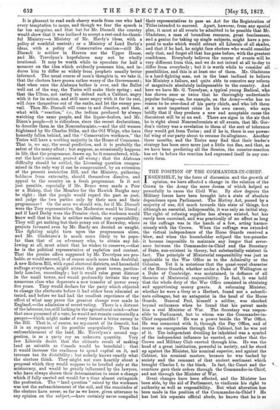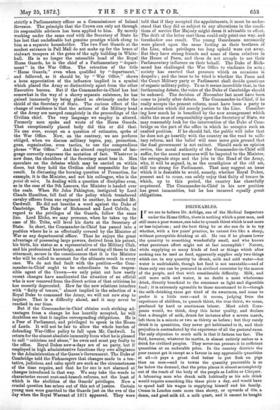THE POSITION OF THE COMMANDER-IN-CHIEF.
INSENSIBLY, by the force of discussion and the growth of opinion, we have effected a change in the relation of the Crown to the Army the mere dream of which helped so
powerfully to cause the Civil War. By slow degrees the Military forces have been brought into a state of absolute
dependence upon Parliament. The Mutiny Act, passed by a majority of one, did much towards this state of things, but although an essential, indispensable, it was only an initial step. The right of refusing supplies has always existed, but has rarely been exercised, and was practically of no effect as long as the suffrage was in the hands of a few, acting harmo- niously with the Crown. When the suffrage was extended the virtual independence of the Horse Guards received a blow, and when the householder eclipsed the ten-pounder it became impossible to maintain any longer that sever- ance between the Commander-in-Chief and the Secretary of State, non-existent in theory, but substantially existent in fact. The principle of Ministerial responsibility was just as applicable to the War Office as to the Admiralty or the Colonies. Yet it is notorious that the quasi-royal character of the Horse Guards, whether under a Duke of Wellington or a Duke of Cambridge, was maintained, in defiance of all theories of Ministerial responsibility. In fact, it was held that the whole duty of the War Office consisted in obtaining and apportioning money grants. A reforming Minister, whether he were a Grey or a Herbert, found not a subordi- nate colleague, but an antagonist in the head of the Horse Guards. General Peel, himself a soldier, was shocked beyond endurance when he found that his patent made him a real Minister of War. The Secretary was respon- sible to Parliament, but to whom was the Commander-in- Chief responsible He was a power beside the War Office. He was connected with it, through the Pay Office, and of course on emergencies through the Cabinet, but he was not of it. The independent dwelling he inhabited was a symbol of the independent influence he exerted, or rather that the Crown and Military Club exerted through him. He was the head of a great institution, powerful in society, and he stood up against the Minister, his nominal superior, and against the Cabinet, his nominal masters, because he was backed by society and the remnant of that ancient sentiment which brought Charles I. to the block. In fact, the Court and the courtiers gave their orders through the Commander-in-Chief, and not through the Minister of War.
Great changes have been effected, and the Minister has been able, by the aid of Parliament, to vindicate his right to authority as well as responsibility. But what alteration has been made in the position of the Commander-in-Chief He has lost his separate official abode, he knows that he is as strictly a Parliamentary officer as a Commissioner of Inland Revenue. The principle that the Crown can only act through its responsible advisers has been applied to him. By merely working under the same roof with the Secretary of State he has lost that undefinable but genuine prestige which clung to him as a separate householder. The two Foot Guards at the modest entrance in Pall Mall do not make up for the brace of stalwart troopers at the gates of the ugly building in White- hall. He is no longer the ostensible head of the Royal Horse Guards, he is the chief of a Parliamentary " depart- ment " in the War Office. The retention of the title "Horse Guards," even when qualified by "department," and followed, as it should be, by "War Office," shows a keen appreciation of the influence implied in a symbol which placed the Army so distinctively apart from the other Executive bureau. But if the Commander-in-Chief has lost somewhat in the way of a showy separate existence, he has gained immensely by being placed so obviously under the shield of the Secretary of State. The curious effect of the change of residence is that the actions of the Military head of the Army are merged completely in the proceedings of the Civilian chief. The very language we employ is altered. Formerly men spoke and wrote of the Horse Guards. That exceptionally placed body did this or did that. No one ever, except on a question of estimates, spoke of the War Office. Now, on the contrary, we are perforce obliged, when we discuss military topics, pay, promotion, guns, organization, even tactics, to use the compendious phrase "War Office." And the altered employment of lan- guage correctly expresses the mutation of fact. Whatever is now done, the shoulders of the Secretary must bear it. Men speculate on the debates which may be carried on within doors, but they hold the Civilian chief responsible for the result. In discussing the burning question of Promotion, for example, it is the Minister, and not his colleague, who is the point de mire. In dealing with a question of discipline even, as in the case of the 9th Lancers, the Minister is hauled over the coals. When Sir John Pakington, instigated by Lord Claude Hamilton, fell foul of the policy which transferred cavalry officers from one regiment to another, he assailed Mr. Cardwell. He did not breathe a word against the Duke of Cambridge. The Duke of Richmond and Lord Colvile, in regard to the privileges of the Guards, follow the same line. Lord Elcho, we may presume, when he takes up the case of Mr. Tribe, will level his darts at the Secretary of State. In short, the Commander-in-Chief has passed into a position where he is as effectually covered by the Minister of War as any departmental officer. Thus he enjoys the great advantage of possessing large powers, derived from his patent, his birth, his status as a representative of the Military Club, and his professional knowledge, and of exerting all these to the uttermost, secure in the consciousness that it is the Minister who will be called to account for the ultimate result in every case. We do not find fault with the position—the Com- mander-in-Chief ought to be subordinate to the respon- sible agent of the Crown—we only point out how vastly recent changes have ameliorated the situation of an official who is now removed from the direct action of that criticism he has recently deprecated. How far the new relations interfere with "fixity of tenure," almost implied in the selection of a Royal Duke to command the Army, we will not now stop to inquire. That is a difficulty ahead, and it may never be reached in our time.
But if the Commander-in-Chief obtains such striking ad- vantages from a change he has heartily accepted, he will doubtless see that it implies corresponding obligations. He is a Peer of Parliament, and privileged to speak in the House of Lords. It will not be fair to allow the whole burden of defending War-Office policy to fall upon Mr. Cardwell. In return for the almost absolute immunity from what he is pleased to call "criticism and abuse," he owes and must pay fealty to the office. Royal Dukes now-a-days are of no party, but if employed in high administrative functions they owe allegiance to the Administration of the Queen's Government. The Duke of Cambridge told the Fishmongers that changes made in a ten- tative, judicious, and calm spirit are such as the circumstances of the time require, and that he for one is not alarmed at changes introduced in that way. We may take the words to characterize recent root-and-branch reforms, not the least of which is the abolition of the Guards' privileges. Now a crucial question has arisen out of this act of justice. Certain young men were gazetted to the Guards just on the eve of the day when the Royal Warrant of 1871 appeared. They were told that if they accepted the appointments, it must be under- stood that they did so subject to any alterations in the condi- tions of service Her Majesty might deem it advisable to effect. The drift of the letter sent them could only point one way, and foreshadow one result. The young Guardsmen necessarily were placed upon the same footing as their brethren of the Line, when privileges too long upheld were cut away. But they have strong friends and some of them relatives in the House of Peers, and these do not scruple to use their Parliamentary influence on their behalf. The Duke of Rich- mond has challenged the War Office to vindicate its acts ; society has exerted that pressure which on occasions is despotic ; and the issue to be tried is whether the Peers and the Court Military party or Parliament shall decide questions of organic military policy. To us it seems incredible that, in the forthcoming debate, the voice of the Duke of Cambridge should be unheard. The decision of November last mast have been come to jointly after debate. The Commander-in-Chief, if he really accepts the present reform, must have been a party to a resolution which did merely justice to the Line. Consider- ing how much he is benefited by the new arrangement which shifts the onus of responsibility upon the Secretary of State, we may reasonably look for the intervention of the Duke of Cam- bridge on the part of the office in which he occupies such an exalted position. If he should fail, the public will infer that he does not go heartily with the country on the road to mili- tary reform, and the belief will once more gain ground that the dual government is not extinct. Should such an opinion revive, the moral authority of the Commander-in-Chief will suffer, for the sound measures will be imputed to the Minister, the retrograde steps and the jobs to the Head of the Army, who, it will be argued, is, as the mouthpiece of the old set, still too strong for Parliament. That may suggest an issue which it is desirable to avoid, namely, whether Royal Dukes, present and to come, can safely enjoy that fixity of tenure in which, up to this period, the country has cheerfully acquiesced. The Commander-in-Chief in his new position has great immunities, but he has incurred equally great obligations.



































 Previous page
Previous page